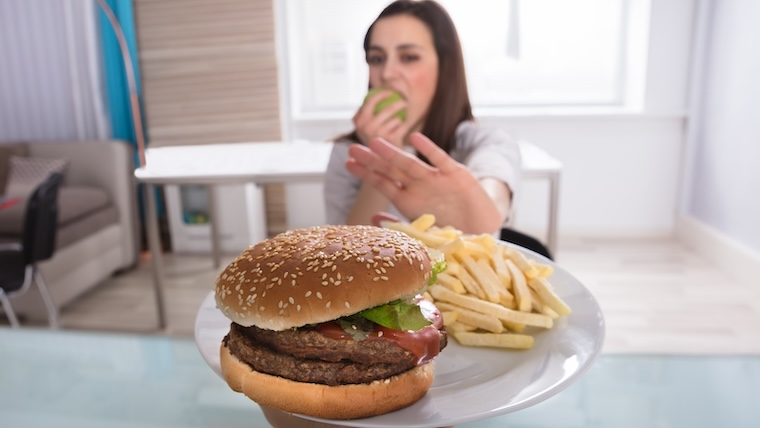Achieving an ideal body fat percentage demands consistency, a well-balanced diet, maintaining a caloric deficit, and hitting the correct macros. Yet, despite these efforts, many people encounter a plateau when trying to shed those last few pounds of fat. How can you break through and finally reach you goal?
Thomas DeLauer, a nutrition coach, celebrity trainer, and health author, recently shared his insights on common dieting mistakes that hinder fat loss and strategies to overcome them. For years, DeLauer believed maintaining a caloric deficit while indulging in occasional large cheat meals was the key to success. However, his approach and understanding have since evolved.
[Related: Red Meat: Friend or Foe For Your Gut?]
The Concept of Cheat Meals & Calorie Restriction
DeLauer explains that a cheat meal can have a more “caloric effect. Because of adaptive thermogenesis, as calories decrease, resting energy expenditure, resting metabolic rate, and base metabolic rate decrease, and it can happen pretty fast,” DeLauer explained.
DeLauer references a study published in the American Journal of Clinical Nutrition, which examined the effects of dietary changes over several weeks. Participants began with one week of overfeeding at a 50% calorie surplus, followed by three weeks in a caloric deficit. The experiment concluded with two weeks of re-feeding at a surplus. (1)
Subjects who experienced a calorie deficit showed a reduction in their resting energy expenditure by 108 calories per day. Of this reduction, 32 calories were attributed to muscle mass loss, while the remaining 76 calories resulted from adaptive thermogenesis — a metabolic adjustment by the body.
“True adaptive thermogenesis, it wasn’t a loss of muscle. It was the fact that the body turned down how much they burn in an effort to maintain. So we lost muscle. Sure, that reduced the amount of calories burned, but the whole system turned everything down,” DeLauer deduced.

DeLauer references a study examining overweight individuals in a three-month calorie deficit, which revealed the participants experienced a reduction of approximately 164 calories due to adaptive thermogenesis. (2) For those who are overweight or obese, the effects of thermogenesis may be even more pronounced, as the body appears to work harder to conserve energy. Therefore, DeLauer suggests controlling cheat meals is critical to prevent weight gain or weight loss plateaus from adaptive thermogenesis.
The Role of Leptin
Leptin, a hormone produced by fat cells, is often thought to boost metabolism after consuming large amounts of food. DeLauer suggests this might not be entirely accurate, referencing a study published in the International Journal of Obesity and Related Metabolic Disorders, where participants followed a controlled isoenergetic diet for three days. Despite consuming the same number of calories, the participants were divided into two groups: one on a high-fat diet and the other on a high-carbohydrate diet. (3)
The group that consumed excess carbohydrates experienced a 28% rise in leptin levels, while the group that overconsumed fats showed no increase in leptin. DeLauer explains that while consuming carbohydrates does lead to a surge in leptin levels, there’s no direct connection between leptin and overall energy expenditure.
“Just because leptin increased doesn’t mean that it drove up the metabolism. It may have been a temporary increase. Eating cheat meals to stimulate leptin won’t fly. It’s not the real way,” DeLauer said.
Cheat Meals and Leptin
Cheat meals could negatively impact leptin sensitivity. DeLauer references a study in which participants followed either a high-calorie or low-calorie diet, and for two days, they consumed diets that were high in carbs, high in fats, or a combination of both. (4)

They found that indulging in two consecutive cheat days increased food consumption over the following four days. This behavior can have lasting adverse effects and may pose potential challenges. “I always thought cheat meals were good, but then when I look back at my personal experience, I do a lot better by just having little bits of cheat meals every day and keeping my metabolism elevated,” DeLauer said.
According to DeLauer, many individuals struggling with excess weight are leptin-resistant. In such cases, having a cheat meal to stimulate leptin is ineffective, as the body cannot respond appropriately. However, fasting can help restore leptin sensitivity over time. A more effective approach might include regular exercise, slightly increasing calorie intake, or experimenting with a slow or significant calorie deficit.
What Is G-Flux?
DeLauer explains that G-Flux — the relationship between calories consumed and burned — enables him to maintain a higher activity level while enjoying a slightly larger food intake rather than eating less and moving less. He has learned balance: enjoy the foods he loves but stay active to offset them.
DeLauer eats without extreme restrictions and doesn’t create a severe deficit that feels miserable. Instead, he maintains balance by eating slightly more and moving more. This keeps things enjoyable and helps preserve his metabolic rate. Rather than indulging in large cheat meals all at once, he opts for smaller portions spread throughout the week.
DeLauer advocates for an alternate daily calorie intake approach as an effective fat loss and management strategy. This method involves alternating between high-calorie and low-calorie days or even incorporating fasting and non-fasting days. According to DeLauer, combining this approach with increased physical activity can help overcome common weight management challenges.
Massive cheat meals are unnecessary and may even be counterproductive, per DeLauer, who is leaning on research that highlights the potential metabolic damage that can occur when the body is suddenly exposed to a calorie surplus after a prolonged calorie deficit. (5)
More In Research
- Red Meat: Friend or Foe For Your Gut?
- Learn The Latest Research On Lateral Raises
- Latest Meta-Analysis on Training Frequency for Hypertrophy
References
- Müller, M. J., Enderle, J., Pourhassan, M., Braun, W., Eggeling, B., Lagerpusch, M., . . . Bosy-Westphal, A. (2015). Metabolic adaptation to caloric restriction and subsequent refeeding: the Minnesota Starvation Experiment revisited. American Journal of Clinical Nutrition, 102(4), 807–819. https://doi.org/10.3945/ajcn.115.109173
- Jiménez Jaime, T., Leiva Balich, L., Barrera Acevedo, G., de la Maza Cave, M. P., Hirsch Birn, S., Henríquez Parada, S., Rodríguez Silva, J., & Bunout Barnett, D. (2015). Effect of calorie restriction on energy expenditure in overweight and obese adult women. Nutricion hospitalaria, 31(6), 2428–2436. https://doi.org/10.3305/nh.2015.31.6.8782
- Dirlewanger, M., di Vetta, V., Guenat, E., Battilana, P., Seematter, G., Schneiter, P., Jéquier, E., & Tappy, L. (2000). Effects of short-term carbohydrate or fat overfeeding on energy expenditure and plasma leptin concentrations in healthy female subjects. International journal of obesity and related metabolic disorders : journal of the International Association for the Study of Obesity, 24(11), 1413–1418. https://doi.org/10.1038/sj.ijo.0801395
- Apolzan, J. W., Bray, G. A., Hamilton, M. T., Zderic, T. W., Han, H., Champagne, C. M., Shepard, D., & Martin, C. K. (2014). Short-term overeating results in incomplete energy intake compensation regardless of energy density or macronutrient composition. Obesity (Silver Spring, Md.), 22(1), 119–130. https://doi.org/10.1002/oby.20587
- Demaria, T. M., Crepaldi, L. D., Costa-Bartuli, E., Branco, J. R., Zancan, P., & Sola-Penna, M. (2023). Once a week consumption of Western diet over twelve weeks promotes sustained insulin resistance and non-alcoholic fat liver disease in C57BL/6 J mice. Scientific reports, 13(1), 3058. https://doi.org/10.1038/s41598-023-30254-2
Featured image via Shutterstock/Andrey_Popov